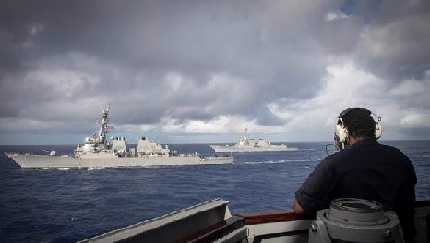
MANILA, Sept 24 (Reuters) - The Philippines on Sunday accused China's coast guard of installing a "floating barrier" in a disputed area of the South China Sea, saying it prevented Filipinos from entering and fishing in the area.
Manila's coast guard and Bureau of Fisheries and Aquatic Resources "strongly condemn" China's installation of the barrier in part of the Scarborough Shoal, Commodore Jay Tarriela, a coast guard spokesperson, posted on the X social media platform, formerly Twitter.
The barrier blocking fishermen from the shoal was depriving them of their fishing and livelihood activities", he said.
"The (Philippine Coast Guard) will continue to work closely with all concerned government agencies to address these challenges, uphold our maritime rights and protect our maritime domains," Tarriela said.
The Chinese embassy in Manila did not immediately reply to requests for comment.
China claims 90% of the South China Sea, overlapping with the exclusive economic zones of Vietnam, Malaysia, Brunei, Indonesia and the Philippines. Beijing seized the Scarborough Shoal in 2012 and forced fishermen from the Philippines to travel further for smaller catches.
Beijing allowed Filipino fishermen to return to the uninhabited shoal when bilateral relations were improving markedly under then-President Rodrigo Duterte. But tension has mounted again since his successor, Ferdinand Marcos Jr, took office last year.
Philippine coast guard and fisheries bureau personnel discovered the floating barrier, estimated at 300 m (1,000 feet) long, on a routine patrol on Friday near the shoal, locally known as Bajo de Masinloc, Tarriela said.
Three Chinese coast guard rigid-hull inflatable boats and a Chinese maritime militia service boat installed the barrier when the Philippine vessel arrived, he said.
Filipino fishermen say China typically installs such barriers when they monitor a large number of fishermen in the area, Tarriela said.
The Chinese boats issued 15 radio challenges and accused the Philippine ship and fishermen of violating international and China's laws, before moving away "upon realizing the presence of media personnel onboard the (Filipino) vessel", he said.




